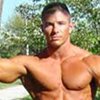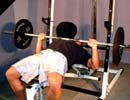Preparing for a contest does not start at 12 weeks out from a show. It begins the minute you walk off the stage after, hopefully, grabbing a nice trophy. Off-season contest preparation consists of numerous aspects of bodybuilding: nutrition, cardiovascular training, mass building, research, and psychological recuperation.
Nutrition
For most off-season bodybuilders, post-contest is the time to put on the fat and hit the drive-thru's. Up until recently, that has been the case for myself. However, I've found that keeping closer to your contest weight is optimal for many reasons. One good reason is that, if you did well enough in the show, you might get some offers for photo sessions, modeling, etc. If you stay within 10-20 pounds of your contest weight it will be much easier to get back into shape.
The second reason to keep from over-bulking in the off-season is the stress placed on your cardiovascular system when you are holding extra weight. I caught myself breathing heavily when I was working and just thought that was a problem. If you put on too much weight you will have elevated blood pressure, elevated heart rate, and elevated cholesterol. I highly recommend keeping within the 10-20 pound range for this reason.
Another good reason to maintain a healthy weight in the off-season is to keep the added stress off your knee joints. I found that when I was around 231, my knees were constantly sore. As I'm dropping the extra weight I find that my knee don't hurt as much which makes my daily activities much easier as well as improving my leg workouts as I have less pain.
Recommendation:
Keep to a good, sound diet that maintains an adequate protein/carb level to keep the muscles growing. Here's an example of my off-season diet:
| 8:00 | 4 Egg whites, 3 Pieces wheat toast |
| 10:00 | Protein Shake |
| 12:00 | 8 oz. Steak, Potatoes, Asparagus |
| 2:00 | Protein Bar |
| 4:00 | Protein Shake |
| 8:00 | 8 oz. Chicken, Pasta, Green Beans |
| 11:00 | Protein Shake |
I think this is a pretty fair diet that helps to keep the excess weight down while including enough protein to keep those muscles growing. To the right is a picture of me before I began my last contest prep and the one on the far right is about 5 weeks out.
Cardiovascular Conditioning
This is something new that I'm trying this year to keep myself healthy in the off-season. For those of you who have taken the time to read my contest-preparation articles (thanks) this is a little bit of a different kind of cardiovascular training.
When I do my off-season cardio I keep the intensity and the time down to a moderate level. This is not really the point at which I am trying to lose a lot of body fat. It is more of a maintenance aspect of bodybuilding. I typically do 35 minutes a day at a pace of 3.6 mph. I have found that this is just enough to keep the fat off while not sacrificing time with family that you do during contest-prep. Family time is very important to me as my wife and I just had a baby and I need to spend time with them.
Recommendations:
Treadmill: 35 minutes; 3 x's/week
Mass Building
This is perhaps one of the most decisive factors on how well you are going to do the next show. Considering that you are not going through the stresses of pre-contest (carb restriction, extensive cardio, posing, increasing anxiety) this is the ideal time to focus on putting on the good quality muscle you lacked in the previous show (at least in my experience).
Physiologically, muscles respond to resistance exercise through hypertrophy, or increasing the size of the muscle tissue. It would be nice if we could actually add new muscle fibers but that just isn't going to happen unless you have $5-6k for growth hormone. So, let's just pretend you don't. How are you going to reap the greatest gains in muscle during these precious nine months? Simple: Use as much weight as possible! The more weight you use, the more hypertrophy your muscles will demonstrate.
From what I learned in my exercise physiology classes in college, the larger muscle fibers (Type IIb) are recruited during lower repetition/higher weight sets. In other words, do fewer reps and more weight. You must take into consideration the safety factor. I always make sure I am properly warmed up and stretched before I begin working out especially in the off-season.
After I warm up, I begin with a moderate weight and I perform it eight times. I then add weight, depending upon the muscle group and the exercise, and perform another eight reps. I continue this process another time for a total of three sets at which time I will increase more than usual (e.g. 30 pounds versus 20 pounds) and do six reps or to failure.
- Set 1: 245 x 8
- Set 2: 265 x 8
- Set 3: 285 x 8
- Set 4: 315 x 6
I find that this is a great way of really tearing down the muscle fibers. I will increase the beginning weight by 10 pounds the next time I do flat bench (which is every other week) and each subsequent set by 10 pounds. This will make you grow.
One thing to keep in mind is that not all muscles respond in the same manner. For instance, I can do this with my chest, my biceps, and my quads and really have a great workout. However, for my back, hamstrings, shoulders, and triceps I need to pyramid down from 12 reps to 6 reps using lighter weight on the first set, increase each set until the final set I am only able to perform 6 reps. I get a much better workout this way for these muscles groups. You will have to tailor your workouts and find which way to train to best pack on the muscle.
Research
Researching bodybuilding is one of the things I enjoy most about the sport. There is no one best way to do anything. I find that through reading other articles on Bodybuilding.com, trying different workouts, and listening to other bodybuilders is the best way to research the sport.
One thing I am always weary of, however, is that some pro bodybuilders have strange ways and ideas of how best to workout. One might say that he does 30 sets for one particular muscle group where another might state that he only does two maximal effort sets (ring a bell?). If I am going to try a workout I must be convinced that the theory behind the workout is sound and that it is going to work no matter what I take. I have found that Lee Priest's biceps routine is outstanding and I've been using it for about 4 months.
I alternate exercises each time I work a particular muscle group. I will typically only do about 4-5 different exercises for one muscle group but I will rotate these every workout. I think, for example, I have about 15 exercises in my repertoire that I will rotate in and out throughout the off-season and contest season. This will keep your body guessing and will lessen the likelihood of plateauing or having your body get used to your program. This is the best way to grow and is a form of self-experimentation.
I take advise from a few bodybuilders that I know personally. I take it only if I think it is sound and has a practical application for my needs. I am fortunate to have a friend that is a personal trainer and he is always giving me new ideas on dieting and training that help me to progress well through the off-season. Find a person in the gym that you think has the kind of build you would like to have and carefully ask them questions. DO NOT ask them what steroids they take (see my "How Not To Get Yelled At In The Gym" article).
Finally, I like to look through my contest photos and watch the videos to see what I need to work on. There is not one person out there that thinks they were the best they could be. If they did think this way, they might as well retire as bodybuilding is all about improving from one year to the next. I will go through all my photos and see what muscles looked too small, I will compare right versus left and make sure I was symmetrical, I will check proportion, and then I will see what problem areas (fat/water storage) need to be taken care of before the next big show. Again, this is research.
Psychological Recuperation
Recovering physically as well as mentally is highly important following a contest. I typically will take at least one week off from the gym to give my mind and body a rest. Many people that more time off is better but I've just found that after about a week I am ready to get back after it. I think that is something you will have to see what your own mind tells you.
Relaxing on your stringent diet regimen is another good way to recover your psyche after a big show. Go out and have a good meal following the night competition. However, you must be careful about spiking your insulin and making yourself sick. If that happens you just undid what you were setting out to do and you will spend most of your celebration time on the porcelain princess. Just do it in moderation and you'll be fine.
Yet another suggestion of mine would be to return to those hobbies that you had before the contest season began. Personally, I was ready to get back out my motorcycle and go spinning through the mud. You should also have more time to spend with your family and friends as I'm sure you have neglected them over the past 12 week period.

